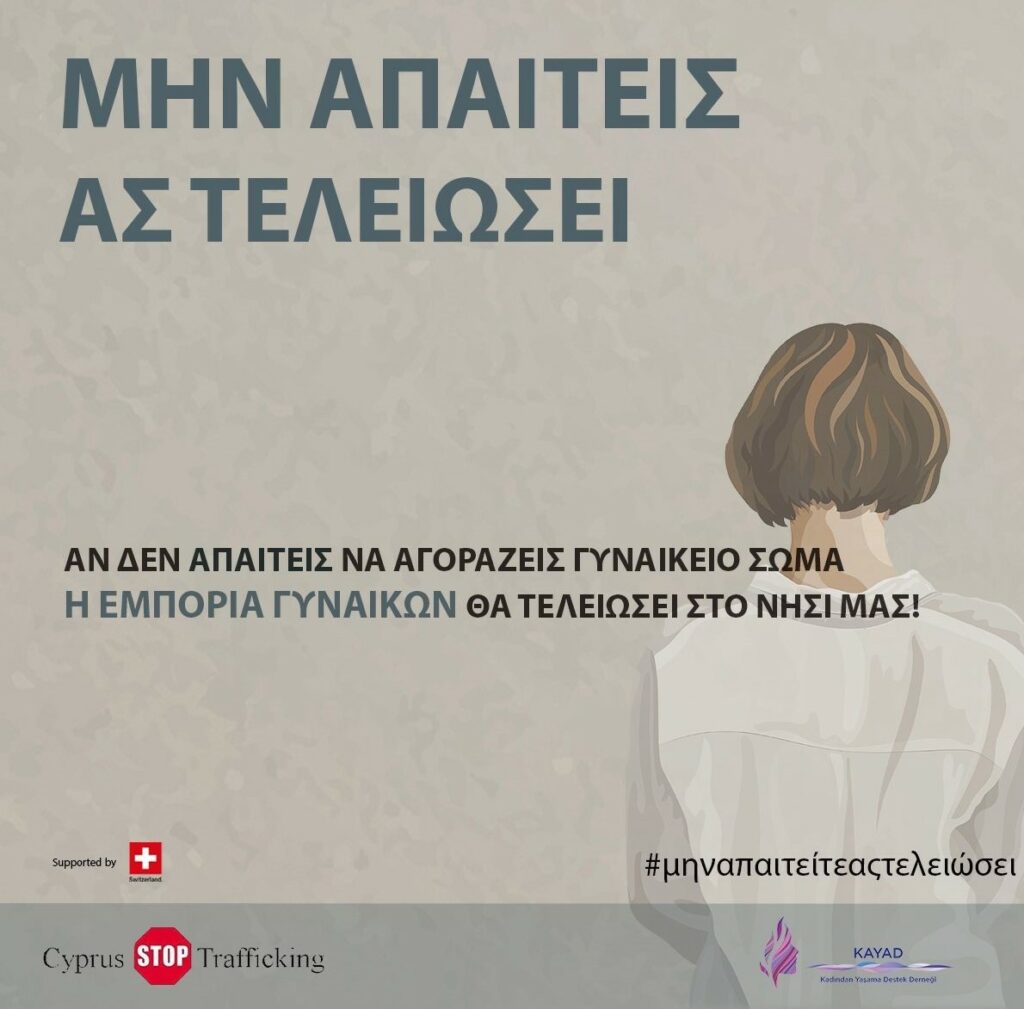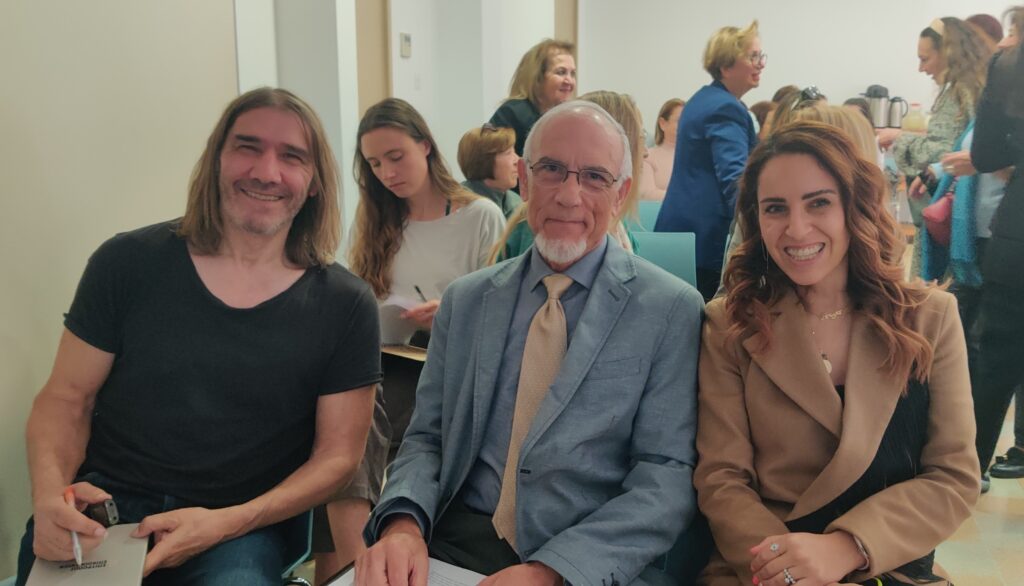Filenews 24 March 2024 - by Marios Demetriou
Greek Cypriots who go to the occupied areas and purchase sexual services from trafficked foreign women working in nightclubs, casinos, pubs and other "leisure" venues are among the male clients who contribute to the increased demand, empowerment and consolidation of trafficking in occupied Cyprus.
Turkish soldiers and other Turkish nationals, some of whom visit the area for "weekend" sex tourism, as well as men from other countries, are also daily financiers of trafficking in women for sexual exploitation in occupied Cyprus, Turkish Cypriot researcher Mine Yucel revealed at a bi-communal conference on March 12, 2024 at the Home for Cooperation in Nicosia. This crime occurs in the free areas of the island, but also internationally, since it is favoured by the general culture of social acceptance of the sex market by men. This bi-communal event was co-organized by the Greek Cypriot humanitarian organization Cyprus STOP Trafficking and the Turkish Cypriot KAYAD. It was supported by the Swiss Embassy in Cyprus and was attended by Swiss Ambassador Christoph Burgener. Cyprus STOP Trafficking, which since 2007 has identified, sheltered and helped women victims of trafficking escape their exploiters, said in a statement that it has often worked with KAYAD and other Turkish Cypriot organizations, such as the Human Rights Platform, that support defenceless women victims of violence. In the panel discussion, which was held in English, were along with Mine Yucel, political scientist Efi Xanthou, lawyer-internationalist Stavri Kalopsidiotou and lawyer Sevilay Yildirimer. The moderator was political activist and lawyer Mine Atli.
As stated to "F", the secretary of Cyprus STOP Trafficking, Nelson Neocleous, "it was found in the discussion that brutal abuse and trafficking of persons, unfortunately, continue in Cyprus, due to shortcomings in the regulatory framework, insufficient political will, traditional culture, lack of information and excessive tolerance of the public. It was also found that while the Cyprus issue is pending, cooperation to combat trafficking in women (persons in general) throughout Cyprus is difficult and really requires a great effort, while it is much easier for criminals to cooperate with each other successfully. He added that "the political pressure and legislation of 2014 and 2019 in the free areas and the closure of the majority of infamous nightclubs, mostly transferred the problem of sex tourism to the occupied areas. However, our organization acknowledges the efforts of the mayor of occupied Nicosia, Mehmet Harmanci, whose actions have recently closed many infamous nightclubs in Nicosia." We note that in 2009 the Ministry of Interior (under Minister Neoklis Sylikiotis) abolished the "visa artist" and in the following period about 90 of the 108 cabarets operating in the free areas were closed.
As the founder and honorary president of Cyprus Stop Trafficking Androulla Christofidou Henriques writes in her book "The Story of a Non-Governmental Organization", "these girls came with a singer's or dancer's contract, but when they arrived at the nightclubs, they were forced to provide sexual services to those customers who bought them and the money was of course pocketed by the cabaretz". In 2014, the Cypriot Parliament passed a law criminalizing the client of sex trafficking and providing harsher penalties for perpetrators. In 2019, the Parliament passed an amending proposal by Christiana Erotokritou, which essentially turns the demand, receipt and use of services by victims of trafficking into a crime of strict liability. Based on this provision, the law provides for even harsher penalties and has the obvious intention of making it easier to prove the offence. Mr. Neocleous told us that Cyprus STOP Trafficking cooperates with state agencies such as the Police Office for Combating Trafficking in Persons and the Social Welfare Services.

"Ally" the occupation regime
As evidenced by the presentation of Mine Yucel, the "ally" of traffickers in the "Turkish Cypriot community", is the legislation and in particular the immigration model of the occupation regime, which prohibits these women from leaving their jobs and their employer in the nightclub in which they were originally hired on the basis of their visa. Otherwise, they will be deported. Essentially, the occupation regime "compels" them to accept their prostitution by traffickers, even if they do not like the conditions of their work, in order to ensure their stay and their work, thus making them more vulnerable to exploitation. Mine Yucel presented shocking data from its first investigation in 2006 into trafficking of foreign women in the occupied territories, with descriptions and testimonies of degrading treatment of victims. In one case, a female cabaret worker revealed that she works day and night at the cabaret. "I only go out," he said, "when the customer who buys me takes me out. They don't even let us go to the grocery store, a little further down. We don't have a holiday.

My only vacation is when I'm on my period. Then they don't force me to go out with clients, but I have to do other cabaret jobs." The Turkish Cypriot researcher also referred to a report she prepared in 2015 on the exploitation of foreign seasonal workers in the agricultural sector in the occupied areas, especially from Turkey. Degradingly low wages, miserable working and living conditions, cases where even their underage children are recruited to daily manual labour in the fields, instead of being in school, are some of the findings of her research. Her most recent 2018 study on the exploitation of foreign women arriving as students in the occupied territories, mainly from African countries, is shocking. It says many of them have been raped and some murdered. One of the cases of human trafficking recorded by the investigation concerns a local couple who recruit students from Africa and force them into prostitution, using as brothels various apartments they rent in the Kyrenia area. It is worth noting that 30% of the total population in the occupied areas are foreign university students, especially from sub-Saharan Africa, South and Central Asia and the Middle East.
The US State Department on the occupation regime
Indicative of the current situation regarding human trafficking on both sides of the barbed wire on the island, is the 2023 annual report of the US Department of State on human trafficking in the world for the period 2023, where the Republic of Cyprus remains in the honorary category 1 of countries that meet the minimum criteria for the elimination of trafficking in persons. On the contrary, according to the report, "the Turkish Cypriot authorities did not pursue any efforts to provide protection and assistance to victims, or to prevent trafficking in human beings."

The US report states that "Turkish Cypriot authorities do not meet minimum standards for the eradication of human trafficking and are not making significant efforts to do so." Turkish Cypriot authorities reported that 26 nightclubs in the area run by Turkish Cypriots employed 1,353 women during the reported period, while observers report that the nightclubs operate as brothels where women are trafficked. Traffickers exploit women from Central Asia, Eastern Europe and Africa for sex trafficking in nightclubs licensed and regulated by Turkish Cypriot authorities."
According to the report, "traffickers coerce vulnerable foreign students into sexual encounters with clients in apartments, after deceiving them with false promises through recruiters of the ring, to travel to the occupied territories, ostensibly for studies. Yet the Turkish Cypriot "police" did not identify victims of human trafficking and did not provide protection to victims, or social, economic and psychological services.
Regarding the Republic of Cyprus, the US report acknowledges that "the country has made continuous efforts to tackle human trafficking, while authorities have identified more victims and imposed harsher penalties for perpetrators of human trafficking crimes. To speed up court proceedings, the Attorney General's Office prioritised trafficking cases and allowed online testimony to protect victims from psychological re-traumatisation during trials." However, the report notes that "smugglers are exploiting short-term tourist visas available to people from Ukraine and Russia to recruit young women for sexual exploitation in bars and other private facilities, or with false promises of marriage or work."
The Multidisciplinary Group should be active
"The Multidisciplinary Coordination Group against Trafficking in Human Beings was created by the Law on the Prevention, Combating of Trafficking and Exploitation of Persons and Protection of Victims of 2014, but since then it has met only a few times!" observed political scientist Efi Xanthou. "The law clearly provides that its members must meet every 3 months, or at least 3 times a year. The Minister of the Interior, who chairs the Group as National Coordinator, apparently did not consider this obligation important enough. No unit has been set up to manage this issue, either at the level of the Ministry of Interior or at the level of the Immigration Department. The law should have been amended in January 2021, when the Deputy Ministry of Social Welfare was established, which must participate in the Multidisciplinary Group and certainly must now be amended with the establishment of the new Deputy Ministry of Migration. We recall that promises to amend the law were made at a meeting of the parliamentary Human Rights Committee last November. Perhaps the solution is to put the new Deputy Minister of Migration at the head of the Multidisciplinary Group, when and if he is appointed..."
A 'terrifying tool' in the hands of smugglers
As the lawyer-internationalist Stavri Kalopsidiotou stressed in her statement, "the figures reveal the frightening dimensions that trafficking in persons is taking in the context of globalization, increased mobility within the EU, migration flows due to conflicts, climate crises and socio-economic factors, with the simultaneous development of the internet and new technologies." He added: "Recognising that since the adoption of the existing Anti-Trafficking Directive in 2011, several new challenges have developed and following repeated calls from the European Parliament and civil society, the European Commission has proposed its revision. Particularly indicative is the fact that the expansion of new technologies has become a frightening tool in the hands of traffickers to "advertise" supply and increase demand, reach and exploit vulnerable people.
The proposed revision – the adoption of which has not yet been finalised – if the suggestions agreed by the European Parliament and the Council are adopted, would significantly update existing legislation. Among other things, provisions on forced marriage, illegal adoption and the exploitation of surrogacy will be included among the forms of exploitation covered by the Directive. At the same time, the scope of crime will explicitly include trafficking offences committed or facilitated online and cyberspace, so that national authorities are better equipped to investigate and prosecute offences committed in whole or in part online. It will introduce mandatory sanctions against companies responsible for trafficking offences and require member states to formally establish national referral mechanisms. In addition, it is expected to criminalise the use of services received by victims of trafficking when the user is aware of it and data collection will be institutionalised on an annual basis."
